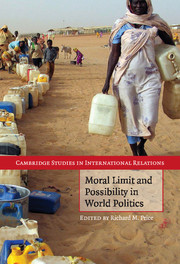Book contents
- Frontmatter
- Contents
- List of contributors
- Preface
- 1 Moral limit and possibility in world politics
- 2 Constructivism and the structure of ethical reasoning
- 3 The role of consequences, comparison and counterfactuals in constructivist ethical thought
- 4 Sovereignty, recognition and indigenous peoples
- 5 Policy hypocrisy or political compromise? Assessing the morality of US policy toward undocumented migrants
- 6 Lie to me: sanctions on Iraq, moral argument and the international politics of hypocrisy
- 7 Paradoxes in humanitarian intervention
- 8 Inevitable inequalities? Approaching gender equality and multiculturalism
- 9 Interstate community-building and the identity/difference predicament
- 10 Progress with a price
- Index
- Cambridge Studies in International Relations
- References
8 - Inevitable inequalities? Approaching gender equality and multiculturalism
Published online by Cambridge University Press: 14 May 2010
- Frontmatter
- Contents
- List of contributors
- Preface
- 1 Moral limit and possibility in world politics
- 2 Constructivism and the structure of ethical reasoning
- 3 The role of consequences, comparison and counterfactuals in constructivist ethical thought
- 4 Sovereignty, recognition and indigenous peoples
- 5 Policy hypocrisy or political compromise? Assessing the morality of US policy toward undocumented migrants
- 6 Lie to me: sanctions on Iraq, moral argument and the international politics of hypocrisy
- 7 Paradoxes in humanitarian intervention
- 8 Inevitable inequalities? Approaching gender equality and multiculturalism
- 9 Interstate community-building and the identity/difference predicament
- 10 Progress with a price
- Index
- Cambridge Studies in International Relations
- References
Summary
Introduction
Through the identification of previously understudied dynamics and mechanisms of change, constructivist analyses can provide new leverage on ethical dilemmas as well as distinctive guides for action. Drawing on the constructivist strand within International Relations (IR) concerned with identity/difference, I try to demonstrate that its (1) focus on self/othering practices, (2) deconstruction of taken-for-granted binaries and (3) demonstration of alternative, feasible interpretations of a problematic all have crucial ethical implications. Although there is no distinctive constructivist set of ethics as such, constructivism is nonetheless central to ethical action since it provides a unique understanding of how the world operates. This, in turn, opens new possibilities for thinking about ethical dilemmas and shows distinctive venues for action. Constructivist scholarship, like the study of international relations in general, is unavoidably normative.
The empirical focus of this chapter is the presumed contradiction between multiculturalism and gender equality, a contradiction which has become a topic of debate concurrent with a rising tide of international migration. The alleged contradiction between multiculturalism and gender equality presents an ethical dilemma for those committed to equality, as there is an apparent trade-off between gender equality and the equal worth of the value systems of different cultural groups. Assertions that the empowerment of women is uniquely and closely tied to Western values and beliefs have indeed become remarkably prevalent.
- Type
- Chapter
- Information
- Moral Limit and Possibility in World Politics , pp. 225 - 252Publisher: Cambridge University PressPrint publication year: 2008
References
- 1
- Cited by



